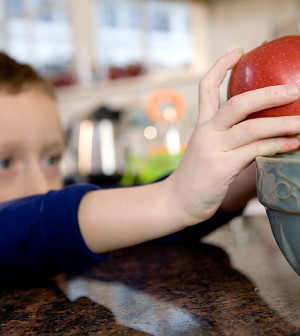- Could Your Grocery Store Meat Be Causing Recurring UTIs?
- Are You Making This Expensive Thermostat Error This Winter?
- Recognizing the Signs of Hypothyroidism
- 10 Strategies to Overcome Insomnia
- Could Artificial Sweeteners Be Aging the Brain Faster?
- Techniques for Soothing Your Nervous System
- Does the Water in Your House Smell Funny? Here’s Why
- Can a Daily Dose of Apple Cider Vinegar Actually Aid Weight Loss?
- 6 Health Beverages That Can Actually Spike Your Blood Sugar
- Treatment Options for Social Anxiety Disorder
How ‘Mindful Eating’ Can Keep Kids Slim

Most childhood obesity-prevention programs stress calorie counting and exercise. But one pediatrician likes to emphasize an approach called “mindful eating” instead.
“Mindful eating is a more compassionate and holistic way to approach healthy eating. It not only focuses on what foods we eat, but on how our bodies feel,” said Dr. Lenna Liu, a pediatrician at Seattle Children’s Hospital. “It allows us to pay attention to hunger and fullness, emotional connections to food and the relationships involved in eating.”
Mindful eating focuses on positives, not negatives, Liu explained. And it requires thinking about why you eat and when.
Reflect on your emotional connections to food, she said. Do you turn to food for comfort or when you’re stressed? Does your child swing by the kitchen for a snack during a commercial every time they’re watching TV?
Better awareness of your family’s eating habits allows you to think of alternatives to reaching for food when you’re feeling an emotion or you’re trying to unwind, but aren’t truly hungry, she added.
Liu noted that hunger develops slowly, but the urge to eat due to emotions can occur suddenly and urgently. Learn to recognize the difference and to help your children to do the same, she suggested.
Liu, who also leads the hospital’s Obesity Program, offers additional tips.
Train yourself to think of food as necessary for physical and mental health, she said, and teach your children that food gives them the energy to learn, think, play and grow.
“When thinking of food in this way, it’s easier to understand that what you choose to eat impacts your health,” Liu explained in a hospital news release. “It’s reinforcement for following the traditional advice of shopping the outer aisles of the grocery store, filling at least half of the plate with fruits and vegetables and choosing water over sugary drinks.”
Eating together as a family and discussing the day helps everyone to slow down and pay attention to what they’re eating, she added.
Sharing responsibility also helps children build a healthy relationship with food, Liu said. The parent provides healthy food and drinks on a regular schedule, and the child decides whether to eat and how much. Eating patterns change as children grow, she pointed out.
Mindful eating is part of a healthy lifestyle that helps prevent obesity and its harmful health effects, she added.
“There is so much stigma around weight, and judgment around right and wrong eating behavior, and good and bad food in our culture,” Liu said. “Mindful eating fills in gaps in the traditional approach of discussing weight management.”
More information
The U.S. National Heart, Lung, and Blood Institute has more on obesity prevention.
Source: HealthDay
Copyright © 2026 HealthDay. All rights reserved.










